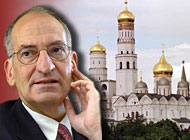Swiss seek reassurance that Russian reform is on course

The Swiss economics minister, Pascal Couchepin, is leading a delegation of industry leaders to Russia to assess whether reforms initiated by President Vladimir Putin have made the country a safer place to do business.
Trade deals between Switzerland and Russia have risen markedly over the past year, but Swiss companies are still far less likely than their overseas competitors to invest directly in Russia.
The risk of not being paid is the most decisive factor in keeping Swiss business away, says Leo Ribeli of the Swiss State Secretariat for Economic Affairs (Seco) and a member of the delegation.
He says Russian importers must battle with an inefficient banking system, and often suffer liquidity problems as a result. The worst affected are small and medium sized firms.
Swiss exports to Russia reached SFr555 million ($323 million) last year, an increase of 56 percent over 1999. Imports from Russia over the same period more than doubled in value, reaching SFr3.67 billion.
More than 90 per cent of that trade deficit is accounted for by Swiss imports of palladium, a precious metal used in the making of catalytic converters.
Some of Russia’s top politicians including the prime minister, Mikhail Kasyanov, and the minister for economic development, German Gref, are expected to push the Swiss delegation to boost their investments in Russia. Currently, only SFr1.2 billion, or 0.4 per cent of Switzerland’s total foreign direct investment (FDI) goes to Russia.
The reason, say Russia experts at the Swiss foreign ministry, is that Swiss investors are justifiably cautious about the Moscow’s ability to push through economic reform.
“The gap in Russia between the political will at the top to carry through the necessary economic reforms, and the ability to actually do so, is considerable,” one diplomat told swissinfo.
He added that most of the reforms introduced by Putin since he took up office last year were watered down in the Russian parliament, the Duma.
He said, too, that scepticism about market forces was still entrenched in the middle and lower echelons of the administration where “it could seriously hamper business at the micro-economic level”.
Despite the difficulties, Leo Ribeli believes the visit should lead to an improvement in Swiss-Russian relations. The visit is the first by a Swiss economics minister in seven years, and some issues on the agenda bode well for the future.
Couchepin is due to sign a deal worth SFr4.9 million to assist in the completion of a real estate register to be located near Moscow. And the delegation is due to travel to Perm at the foot of the Ural Mountains, where Switzerland is already engaged in setting up a water purification system.
Götz Stein, chief executive of Wifag, which makes printing machinery near Bern, summed up the attitude of Swiss entrepreneurs towards the emerging market of 150 million consumers that is Russia.
He said many Russian publishers were keen to acquire modern printing presses to print their publications locally, but when pushed about payment terms had been forced to admit that they couldn’t afford them.
“Russia is risky,” Götz told swissinfo, “but the potential is great.”
by Markus Haefliger

In compliance with the JTI standards
More: SWI swissinfo.ch certified by the Journalism Trust Initiative
You can find an overview of ongoing debates with our journalists here . Please join us!
If you want to start a conversation about a topic raised in this article or want to report factual errors, email us at english@swissinfo.ch.